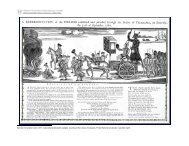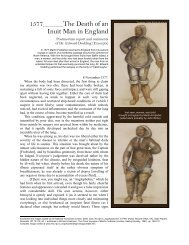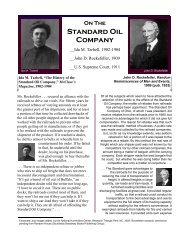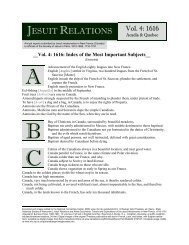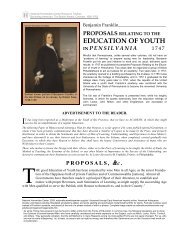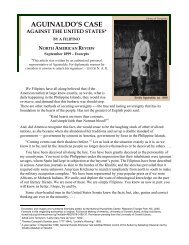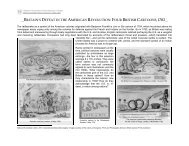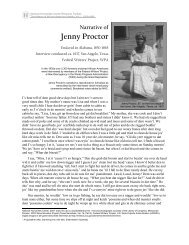Nella Larsen, Passing, novel, 1929, Ch. 3, excerpts - National ...
Nella Larsen, Passing, novel, 1929, Ch. 3, excerpts - National ...
Nella Larsen, Passing, novel, 1929, Ch. 3, excerpts - National ...
You also want an ePaper? Increase the reach of your titles
YUMPU automatically turns print PDFs into web optimized ePapers that Google loves.
<strong>National</strong> Humanities Center Resource Toolbox<br />
The Making of African American Identity: Vol. III, 1917-1968<br />
<strong>Nella</strong> <strong>Larsen</strong><br />
________PASSING<br />
Novel, <strong>1929</strong><br />
* <strong>Ch</strong>. 3<br />
Set in <strong>Ch</strong>icago, <strong>Passing</strong> examines the diverging<br />
lives and chance reunions of two light-skinned<br />
women, Irene Redfield and Clare Kendry Bellew.<br />
This chapter presents a frank discussion of the<br />
social and economic advantages and disadvantages<br />
associated with racial passing.<br />
James Allen / Library of Congress<br />
<strong>Nella</strong> <strong>Larsen</strong>, 1928<br />
O<br />
N TUESDAY MORNING a dome of grey sky rose over the parched city, but the stifling air was<br />
not relieved by the silvery mist that seemed to hold a promise of rain, which did not fall.<br />
To Irene<br />
Redfield this soft foreboding fog was another reason for doing nothing about<br />
seeing<br />
Clare Kendry that afternoon.<br />
But she did see her.<br />
The telephone. For hours<br />
it had rung like something possessed. Since nine o’clock she had been<br />
he aring its insistent jangle. Awhile she was resolute, saying firmly each time: “Not in, Liza, take the<br />
message.” And each time the servant returned with the information: “It’s the same lady, ma’am; she<br />
says she’ll call again.”<br />
But at noon, her nerves<br />
frayed and her conscience smiting her atthe reproachful look on Liza’s ebony<br />
face<br />
as she withdrew for another denial, Irene weakened.<br />
“Oh, never mind. I’ll answer this time, Liza.”<br />
“It’s her again.”<br />
“Hello. . . . Yes.”<br />
“It’s Clare, ’Rene. . . . Where have you been? . . . Can you be here around four? . . . What? But,<br />
’Rene, you promised! Just for a little while. . . . You can if you want to. . . . I am so disappointed. I had<br />
counted so on seeing you. . . . Please be nice and come. Only for a minute. I’m sure you can manage it if<br />
you try. . . . I won’t beg you to stay. . . . Yes. . . . I’m going to expect you . . . It’s the Morgan . . . Oh, yes!<br />
The name’s Bellew, Mrs. John Bellew. . . . About four, then. . . . I’ll be so happy to see you! . . .<br />
Goodbye.”<br />
“Damn!”<br />
Irene hung up the receiver with an emphatic bang, her thoughts immediately filled with self-reproach.<br />
She’d<br />
done it again. Allowed Clare Kendry to persuade her into promising to do something for which she<br />
had neither time nor any special desire. What was it about Clare’s voice that was so appealing, so very<br />
seductive?<br />
Clare met<br />
her in the hall with a kiss. She said: “You’re good to come, ’Rene. But, then, you always<br />
were nice to me.” And under her potent smile a part of Irene’s annoyance with herself fled. She was even<br />
* <strong>National</strong> Humanities Center, 2007: nationalhumanitiescenter.org/pds/. In the public domain. Reprinted in <strong>Nella</strong> <strong>Larsen</strong>, Quicksand and <strong>Passing</strong>, ed.<br />
Deborah E. McDowell (New Brunswick, New Jersey: Rutgers University Press, 1986), pp. 164-176. Complete image credits at nationalhumanitiescenter.org/<br />
pds/maai3/imagecredits.htm.
a little glad that she had come.<br />
Clare led the way, stepping lightly, towards a room whose door was standing partly open, saying:<br />
“There’s<br />
a surprise. It’s a real party, See.”<br />
Entering, Irene found herself in a sitting-room,<br />
large and high, at whose windows hung startling blue<br />
dra peries which triumphantly dragged attention from the gloomy chocolate coloured furniture. And Clare<br />
was wearing a thin floating dress of the same shade of blue, which suited her and the rather difficult room<br />
to perfection.<br />
For a minute<br />
Irene thought the room was empty, but turning her head, she discovered, sunk deep in the<br />
cushions<br />
of a huge sofa, a woman staring up at her with such intense concentration that her eyelids were<br />
drawn as though the strain of that upward glance had paralysed them. At first Irene took her to be a<br />
stranger, but in the next instant she said to an unsympathetic, almost harsh voice: “And how are you,<br />
Gertrude?”<br />
The woman<br />
nodded and forced a smile to her pouting lips. “I’m all right,” she replied. “And you’re<br />
just<br />
the same, Irene. Not changed a bit.”<br />
“Thank you.” Irene responded, as she chose a seat. She was thinking: “Great goodness!” Two of<br />
them.”<br />
For Gertrude<br />
too had married a white man, though it couldn’t be truthfully said that she was “passing.”<br />
Her<br />
husband ⎯ what was his name? ⎯ had been in school with her and had been quite well aware, as had<br />
his family and most of his friends, that she was a Negro. It hadn’t, Irene knew, seemed to matter to him<br />
then. Did it now, she wondered? Had Fred ⎯ Fred Martin, that was it ⎯ had he ever regretted his<br />
marriage because of Gertrude’s race? Had Gertrude?<br />
Turning to Gertrude, Irene asked: “And Fred, how is he? It’s unmentionable years since I’ve seen<br />
him.”<br />
“Oh,<br />
he’s all right,” Gertrude answered briefly.<br />
For a full minute no one spoke. Finally out of the oppressive little silence Clare’s voice came<br />
pleasantly, conversationally: “We’ll have tea right away. I know that you can’t stay long, ’Rene. And<br />
I’m<br />
so sorry you won’t see Margery. We went up the lake over the week end to see some of Jack’s people,<br />
just out of Milwaukee. Margery wanted to stay with the children. It seemed a shame not to let her,<br />
especially since it’s so hot in town. But I’m expecting Jack any second.”<br />
Irene said briefly: “That’s nice.”<br />
Gertrude remained silent. She was,<br />
it was plain, a little ill at ease. And her presence there annoyed<br />
Irene, roused in her a defensive and resentful feeling for which she had at the moment no explanation. But<br />
it did seem to her odd that the woman that Clare was now should have invited the woman that Gertrude<br />
was. Still, of course, Clare couldn’t have known. Twelve years since they had met.<br />
Later, when she examined her feeling of annoyance, Irene admitted, a shade reluctantly,<br />
that it arose<br />
from<br />
a feeling of being outnumbered, a sense of aloneness, in her adherence to her own class and kind;<br />
not merely in the great thing of marriage, but in the whole pattern of her life as well.<br />
Clare spoke again, this time at length. Her talk was of the change that <strong>Ch</strong>icago presented<br />
to her after<br />
her<br />
long absence in European cities. Yes, she said in reply to some question from Gertrude, she’d been<br />
back to America a time or two, but only as far as New York and Philadelphia, and once she had spent a<br />
few days in Washignton. John Bellew, who, it appeared, was some sort of international banking agent,<br />
hadn’t particularly wanted her to come with him on this trip, but as soon as she had learned that it would<br />
probably take him as far as <strong>Ch</strong>icago, she made her mind up to come anyway.<br />
“I simply had to. And after I once got here I was determined to see someone<br />
I knew and find out what<br />
had<br />
happened to everybody. I didn’t quite see how I was going to manage it, but I meant to. Somehow.<br />
I’d just about decided to take a change and go out to your house, ’Rene, or call up and arrange a meeting,<br />
when I ran into you. What luck!”<br />
Irene agreed that it was luck. “It’s<br />
the first time I’ve been home for five years, and now I’m about to<br />
leave.<br />
A week later and I’d have been gone, And how in the world did you find Gertrude?”<br />
<strong>National</strong> Humanities Center <strong>Nella</strong> <strong>Larsen</strong>, <strong>Passing</strong>, <strong>1929</strong>, <strong>Ch</strong>. 3. 2
“In the book. I remembered about Fred. His father still has the meat market.”<br />
“Oh, yes,” said Irene, who had only remembered it as Clare had spoken, “on Cottage Grove near ⎯”<br />
Gertrude broke in. “No. It’s moved. We’re on Maryland Avenue ⎯ used to be Jackson ⎯ now. Near<br />
Sixty-third<br />
Street. And the market’s Fred’s. His name’s the same as his father’s.”<br />
Gertrude, Irene thought, looked as if her husband might be a butcher. There was<br />
left of her youthful<br />
prettiness, which had been so much admired in their high-school days, no trace. She had grown broad, fat<br />
almost, and though there were no lines on her large white face, its very smoothness was somehow<br />
prematurely ageing. Her black hair was clipt, and by some unfortunate means all the live curliness had<br />
gone from it. Her over-trimmed Georgette crêpe dress was too short and showed an appalling amount of<br />
leg, stout legs in sleazy stockings of a vivid rose-beige shade. Her plump hands were newly and not too<br />
competently manicured — for the occasion, probably. And she wasn’t smoking.<br />
Clare said — and Irene fancied that her husky voice held a slight edge — “Before<br />
you came, Irene,<br />
Gertrude<br />
was telling me about her two boys. Twins. Think of it! Isn’t it too marvellous for words?”<br />
Irene felt a warmness creeping into her cheeks. Uncanny, the way Clare could divine what one was<br />
thinking.<br />
She was a little put out, but her manner was entirely easy as she said: “That is nice. I’ve two<br />
boys myself, Gertrude. Not twins, though. It seems that Clare’s rather behind, doesn’t it?”<br />
Gertrude, however, wasn’t sure that Clare hadn’t the best of it. “She’s got a girl. I wanted<br />
a girl. So did<br />
Fred.”<br />
“Isn’ t that a bit unusual?” Irene asked. “Most men want sons. Egotism, I suppose.”<br />
“Well, Fred didn’t.”<br />
The tea-things had been<br />
placed on a low table at Clare’s side. She gave them her attention now,<br />
po uring the rich amber fluid from the tall glass pitcher into stately slim glasses, which she handed to her<br />
guests, and then offered them lemon or cream and tiny sandwiches or cakes.<br />
After taking up her own glass she informed them: “No, I have no boys and I don’t think I’ll ever<br />
have<br />
any. I’m afraid. I nearly died of terror the whole nine months before Margery was born for fear<br />
that she might be dark. Thank goodness, she turned out all right. But I’ll never risk it again. Never! The<br />
strain is simply too ⎯ too hellish.”<br />
Gertrude Martin nodded in complete comprehension.<br />
This time it was Irene who said nothing.<br />
“You don’t have to tell me!” Gertrude said<br />
fervently. “I know what it is all right. Maybe you don’t<br />
think<br />
I wasn’t scared to death too. Fred said I was silly, and so did his mother. But, of course, they<br />
thought it was just a notion I’d gotten into my head and they blamed it on my condition. They don’t<br />
know like we do, how it might go way back, and turn out dark no matter what colour the father and<br />
mother are.”<br />
Perspiration<br />
stood out on her forehead. Her narrow eyes rolled first in Clare’s, then in Irene’s<br />
direction.<br />
As she talked she waved her heavy hands about.<br />
“No,” she went on, “no more for me either. Not even a girl.<br />
It’s awful the way it skips generations and<br />
then<br />
pops out. Why, he actually said he didn’t care what colour it turned out, if I would only stop<br />
worrying about it. But, of course, nobody wants a dark child.” Her voice was earnest and she took for<br />
granted that her audience was in entire agreement with her.<br />
Irene, whose head had gone up with a quick little jerk, now<br />
said in a voice of whose even tones she<br />
was<br />
proud: “One of my boys is dark.”<br />
Gertrude jumped as if she had been shot at. Her eyes goggled. Her mouth flew open. She tried to<br />
spe ak, but could not immediately get the words out. Finally she managed to stammer: “Oh! And your<br />
husband, is he ⎯ is he ⎯ er ⎯ dark, too?”<br />
Irene, who was struggling with a flood of feelings, resentment, anger, and contempt, was, however,<br />
still able to answer as coolly as if she had not that sense of not belonging to and of despising the company<br />
in which she found herself drinking iced tea from tall amber glasses on that hot August afternoon. Her<br />
husband, she informed them quietly, couldn’t exactly “pass.”<br />
<strong>National</strong> Humanities Center <strong>Nella</strong> <strong>Larsen</strong>, <strong>Passing</strong>, <strong>1929</strong>, <strong>Ch</strong>. 3. 3
At that reply Clare turned on Irene her seductive caressing smile and remarked a little scoffingly: “I<br />
do think that coloured people ⎯ we ⎯ are too silly about some things. After all, the thing’s not<br />
important to Irene or hundreds of others. Not awfully, even to you, Gertrude. It’s only deserters like<br />
me<br />
who have to be afraid of freaks of the nature. As my inestimable dad used to say, ‘Everything must be<br />
paid for.’ Now, please one of you tell me what ever happened to Claude Jones. You know, the tall,<br />
lanky specimen who used to wear that comical little moustache that the girls used to laugh at so. Like<br />
a<br />
thin streak of soot. The moustache, I mean.”<br />
At that Gertrude shrieked with laughter. “Claude<br />
Jones!” and launched into the story of how he was<br />
no longer a Negro or a <strong>Ch</strong>ristian but had become a Jew.<br />
“A Jew!” Clare exclaimed.<br />
“Yes, a Jew. A black Jew, he<br />
calls himself. He won’t eat ham and goes to the synagogue on<br />
Saturday.<br />
He’s got a beard now as well as a moustache. You’d die laughing if you saw him.<br />
He’s really too funny for words. Fred says he’s crazy and I guess he is. Oh, he’s a scream all right,<br />
a<br />
regular<br />
scream!” And she shrieked again.<br />
Clare’s laugh tinkled out. “It certainly sounds<br />
funny enough. Still, it’s his own business. If he gets<br />
along<br />
better by turning ⎯”<br />
At that, Irene, who was still<br />
hugging her unhappy don’t-care feeling of rightness, broke in, saying<br />
bitingly:<br />
“It evidently doesn’t occur to either you or Gertrude that he might possibly be sincere in<br />
changing his religion. Surely everyone doesn’t do everything for gain.”<br />
Clare Kendry had no need to search for the full meaning of that utterance.<br />
She reddened slightly and<br />
ret orted seriously: “Yes, I admit that might be possible ⎯ his being sincere, I mean. It just didn’t happen<br />
to occur to me, that’s all. I’m surprised,” and the seriousness changed to mockery, “that you should have<br />
expected it to. Or did you really?”<br />
“You don’t, I’m sure, imagine that<br />
that is a question that I can answer,” Irene told her. “Not here<br />
and<br />
now.”<br />
Gertrude’s<br />
face expressed complete bewilderment. However, seeing that little smiles had come out<br />
on the faces of the two other women and not recognizing them for the smiles of mutual reservations<br />
which they were, she smiled too.<br />
Clare began to talk, steering carefully<br />
away from anything that might lead towards race or other<br />
thorny subjects. It was the most brilliant exhibition of conversational weightlifting that Irene had ever<br />
seen. Her words swept over them in charming well-modulated streams. Her laughs tinkled and pealed.<br />
Her little stories sparkled.<br />
Irene contributed a bare “Yes” or “No” here and there. Gertrude, a “You don’t say!” less frequently.<br />
For a while the illusion of general conversation was nearly perfect. Irene felt her resentment<br />
changing<br />
gradually to a silent, somewhat grudging admiration.<br />
Clare talked on, her voice, her gestures colouring all she said of wartime in France, of after-thewa<br />
rtime in Germany, of the excitement at the time of the general strike in England, of dressmakers’<br />
openings in Paris, of the new gaiety of Budapest.<br />
But it couldn’t last, this verbal feat. Gertrude shifted<br />
in her seat and fell to fidgeting with her fingers.<br />
Irene,<br />
bored at last by all this repetition of the selfsame things that she had read all too often in papers,<br />
magazines, and books, set down her glass and collected her bag and handkerchief. She was smoothing<br />
out the tan fingers of her gloves preparatory to putting them on when she heard the sound of the outer<br />
door being opened and saw Clare spring up with an expression of relief saying: “How lovely! Here’s<br />
Jack at exactly the right minute. You can’t go now, ’Rene dear.”<br />
John Bellew came into the room. The first thing that Irene noticed<br />
about him was that he was not the<br />
man<br />
that she had seen with Clare Kendry on the Drayton roof. This man, Clare’s husband, was a tallish<br />
person, broadly made. His age she guessed to be somewhere between thirty-five and forty. His hair was<br />
dark brown and waving, and he had a soft mouth, somewhat womanish, set in an unhealthy-looking<br />
dough-coloured face. His steel-grey opaque eyes were very much alive, moving ceaselessly between<br />
<strong>National</strong> Humanities Center <strong>Nella</strong> <strong>Larsen</strong>, <strong>Passing</strong>, <strong>1929</strong>, <strong>Ch</strong>. 3. 4
thick bluish lids. But there was, Irene decided, nothing unusual about him, unless it was an impression of<br />
latent physical power.<br />
“Hello, Nig,” was his<br />
greeting to Clare.<br />
Gertrude who had started slightly, settled back and looked covertly towards Irene, who had caught her<br />
lip between her teeth and sat gazing at husband and wife. It was hard to believe that even Clare Kendry<br />
would permit this ridiculing of her race by an outsider, though he chanced to be her husband. So he knew,<br />
then, that Clare was a Negro? From her talk the other day Irene had understood that he didn’t. But how<br />
rude, how positively insulting, for him to address her in that way in the presence of guests!<br />
In Clare’s eyes, as she presented her husband, was a queer gleam, a jeer, it might be. Irene<br />
couldn’t<br />
define<br />
it.<br />
The mechanical<br />
professions that attend an introduction over, she inquired: “Did you hear what Jack<br />
called<br />
me?”<br />
“Yes,” Gertrude<br />
answered, laughing with a dutiful eagerness.<br />
Irene didn’t speak. Her gaze remained level on Clare’s smiling face.<br />
The black eyes fluttered down. “Tell them, dear, why you call me that.”<br />
The man chuckled, crinkling up his eyes, not, Irene was compelled to acknowledge,<br />
unpleasantly. He<br />
ex plained: “Well, you see, it’s like this. When we were first married, she was as white as ⎯ as ⎯ well as<br />
white as a lily. But I declare she’s gettin’ darker and darker. I tell her if she don’t look out, she’ll wake<br />
up one of these days and find she’s turned into a nigger.”<br />
He roared with laughter. Clare’s ringing bell-like laugh joined his. Gertrude after another uneasy<br />
shift in her seat added her shrill one. Irene, who had been sitting with lips tightly compressed, cried out:<br />
“That’s good!” and gave way to gales of laughter. She laughed and laughed and laughed. Tears ran<br />
down her cheeks. Her sides ached. Her throat hurt. She laughed on and on and on, long after the others<br />
had subsided. Until, catching sight of Clare’s face, the need for a more quiet enjoyment of this priceless<br />
joke, and for caution, struck her. At once she stopped.<br />
Clare handed her husband his tea and laid her hand on his arm with an affectionate little gesture.<br />
Speaking with confidence as well as with amusement, she said: “My goodness, Jack! What difference<br />
would it make if, after all these years, you were to find out that I was one or two per cent coloured?”<br />
Bellew put out his hand in a repudiating fling, definite and final. “Oh, no, Nig,” he declared,<br />
“n othing like that with me. I know you’re no nigger, so it’s all right. You can get as black as you please<br />
as far as I’m concerned, since I know you’re no nigger. I draw the line at that. No niggers in my family.<br />
Never have been and never will be.”<br />
Irene’s lips trembled almost uncontrollably,<br />
but she made a desperate effort to fight back her<br />
disastrous desire to laugh again, and succeeded. Carefully selecting a cigarette from the lacquered<br />
box on<br />
the tea-table before her, she turned an oblique look on Clare and encountered her peculiar eyes fixed on<br />
her with an expression so dark and deep and unfathomable that she had for a short moment the sensation<br />
of gazing into the eyes of some creature utterly strange and apart. A faint sense of danger brushed her,<br />
like the breath of a cold fog. Absurd, her reason told her, as she accepted Bellew’s proffered light for her<br />
cigarette. Another glance at Clare showed her smiling. So, as one always ready to oblige, was Gertrude.<br />
An on-looker, Irene reflected, would have thought it a most congenial tea-party, all smiles and jokes<br />
an d hilarious laughter. She said humorously: “So you dislike Negroes, Mr. Bellew?” But her amusement<br />
was at her thought, rather than her words.<br />
John Bellew gave a short denying laugh.<br />
“You got me wrong there, Mrs. Redfield. Nothing like that at<br />
all.<br />
I don’t dislike them, I hate them. And so does Nig, for all she’s trying to turn into one. She wouldn’t<br />
have a nigger maid around her for love nor money. Not that I’d want her to. They give me the creeps. The<br />
black scrimy devils.”<br />
This wasn’t funny. Had Bellew, Irene inquired, ever known any Negroes? The defensive tone of her<br />
voice<br />
brought another start from the uncomfortable Gertrude, and, for all her appearance of serenity, a<br />
quick apprehensive look from Clare.<br />
<strong>National</strong> Humanities Center <strong>Nella</strong> <strong>Larsen</strong>, <strong>Passing</strong>, <strong>1929</strong>, <strong>Ch</strong>. 3. 5
Bellew answered: “Thank the Lord, no! And never expect to! But I know people who’ve known them,<br />
better<br />
than they know their black selves. And I read in the papers about them. Always robbing and killing<br />
people. And,” he added darkly, “worse.”<br />
From Gertrude’s direction came a queer<br />
little suppressed sound, a snort or a giggle. Irene couldn’t tell<br />
wh ich. There was a brief silence, during which she feared that her self control was about to prove too frail<br />
a bridge to support her mounting anger and indignation. She had a leaping desire to shout at the man<br />
beside her: “And you’re sitting here surrounded by three black devils, drinking tea.”<br />
The impulse passed, obliterated by her consciousness of the danger in which such rashness would<br />
involve Clare, who remarked with a gentle reprovingness: “Jack dear, I’m sure ’Rene doesn’t care to hear<br />
all about your pet aversions. Nor Gertrude either. Maybe they read the papers too, you know.” She smiled<br />
on him, and her smile seemed to transform him, to soften and mellow him, as the rays of the sun does a<br />
fruit.<br />
“All<br />
right, Nig, old girl. I’m sorry,” he apologized. Reaching over, he playfully touched his wife’s pale<br />
hands,<br />
then turned back to Irene. “Didn’t mean to bore you, Mrs. Redfield. Hope you’ll excuse me,” he<br />
said sheepishly. “Clare tells me you’re living in New York. Great city, New York. The city of the future.”<br />
In Irene, rage had not retreated, but was held by some dam of caution and allegiance to Clare. So, in<br />
the best casual voice she could muster, she agreed with Bellew. Though, she reminded him, it was exactly<br />
what <strong>Ch</strong>icagoans were apt to say of their city. And all the while she was speaking, she was thinking how<br />
amazing it was that her voice did not tremble, that outwardly she was calm. Only her hands shook<br />
slightly. She drew them inward from their rest in her lap and pressed the tips of her fingers together to<br />
still them.<br />
“Husband’s<br />
a doctor, I understand. Manhattan, or one of the other boroughs?”<br />
Manhattan, Irene informed him, and explained the need for Brian to be within easy<br />
reach of certain<br />
hospitals<br />
and clinics.<br />
“Interesting life, a doctor’s.”<br />
“Ye-es. Hard, though. And, in a way, monotonous. Nerve-racking too.”<br />
“Hard on the wife’s nerves at least, eh? So many lady patients.” He laughed,<br />
enjoying, with a boyish<br />
heartiness,<br />
the hoary joke.<br />
Irene managed a momentary<br />
smile, but her voice was sober as she said: “Brian doesn’t care for ladies,<br />
especially<br />
sick ones. I sometimes wish he did. It’s South America that attracts him.”<br />
“Coming place, South America, if they ever get the niggers out of it. It’s run over ⎯”<br />
“Really, Jack!” Clare’s voice was on the edge of temper.<br />
“Honestly, Nig, I forgot.” To the others he said: “You see how hen-pecked I am.” And to Gertrude:<br />
“You’re<br />
still in <strong>Ch</strong>icago, Mrs. — er — Mrs. Martin?”<br />
He was, it was plain, doing his best to be agreeable to these old friends of Clare’s. Irene had to<br />
concede that under other conditions she might have liked him. A fairly good-looking man of amiable<br />
disposition, evidently, and in easy circumstances. Plain and with no nonsense about him.<br />
Gertrude replied that <strong>Ch</strong>icago was good enough for her. She’d never been out of it and didn’t think she<br />
ever<br />
should. Her husband’s business was there.<br />
“Of course, of course. Can’t jump up and leave<br />
a business.”<br />
There followed a smooth surface of talk about <strong>Ch</strong>icago, New York, their differences and their recent<br />
spectacular<br />
changes.<br />
It was, Irene, thought,<br />
unbelievable and astonishing that four people could sit so unruffled, so<br />
ostensibly friendly, while they were in reality seething with anger, mortification, shame. But no, on<br />
second thought she was forced to amend her opinion. John Bellew, most certainly, was as undisturbed<br />
within as without. So, perhaps, was Gertrude Martin. At least she hadn’t the mortification and shame that<br />
Clare Kendry must be feeling, or, in such full measure, the rage and rebellion that she, Irene, was<br />
repressing.<br />
“More tea,<br />
’Rene,” Clare offered.<br />
<strong>National</strong> Humanities Center <strong>Nella</strong> <strong>Larsen</strong>, <strong>Passing</strong>, <strong>1929</strong>, <strong>Ch</strong>. 3. 6
“Thanks, no. And I must be going. I’m leaving tomorrow, you know, and I’ve still got packing to do.”<br />
She stood up. So did Gertrude, and Clare, and John Bellew.<br />
“How do you like Drayton, Mrs. Redfield?” the latter asked.<br />
“The Drayton? Oh, very much. Very much indeed,” Irene answered,<br />
her scornful eyes on Clare’s<br />
unrevealing<br />
face.<br />
“Nice place, all right. Stayed there a time or two myself,” the man informed her.<br />
“Yes, it is nice,” Irene agreed. “Almost as good as our best New York places.” She<br />
had withdrawn her<br />
look<br />
from Clare and was searching in her bag for some non-existent something. Her understanding was<br />
rapidly increasing, as was her pity and her contempt. Clare was so daring, so lovely, and so “having.”<br />
They gave their hands to Clare with appropriate murmurs. “So good to have seen you.” . . . “I do hope<br />
I’ll<br />
see you again soon.”<br />
“Good-bye,” Clare returned.<br />
“It was good of you to come, ’Rene dear. And you too, Gertrude.”<br />
“Good-bye, Mr. Bellew.” . . . “So glad to have met you.” It was Gertrude who had said that. Irene<br />
couldn’t,<br />
she absolutely couldn’t bring herself to utter the polite fiction or anything approaching it.<br />
He accompanied them out into the hall, summoned the elevator.<br />
“Good-bye,” they said again, stepping in.<br />
Plunging downward they were silent.<br />
They made their way through the lobby<br />
without speaking.<br />
But as soon as they had reached the street Gertrude, in the manner<br />
of one unable to keep bottled up for<br />
another<br />
minute that which for the last hour she had had to retain, burst out: “My God! What an awful<br />
chance! She must be plumb crazy.”<br />
“Yes, it certainly seems risky,” Irene<br />
admitted.<br />
“Risky! I should say it was. Risky! My God! What<br />
a word! And the mess she’s liable to get herself<br />
into!”<br />
“Still,<br />
I imagine she’s pretty safe. They don’t live here, you know. And there’s a child. That’s a certain<br />
security.”<br />
“It’s an awful chance, just the same,” Gertrude insisted. “I’d never in the world have married Fred<br />
without<br />
him knowing. You can’t tell what will turn up.”<br />
“Yes, I do agree that it’s safer to tell. But then Bellew wouldn’t have married her. And, after all, that’s<br />
what<br />
she wanted.”<br />
Gertrude shook her<br />
head. “I wouldn’t be in her shoes for all the money she’s getting out of it, when he<br />
finds<br />
out. Not with him feeling the way he does. Gee! Wasn’t it awful? For a minute I was so mad I could<br />
have slapped him.”<br />
It had been, Irene acknowledged, a distinctly trying experience, as well as a very unpleasant one. “I<br />
was<br />
more than a little angry myself.”<br />
“And imagine her not telling us about<br />
him feeling that way! Anything might have happened. We might<br />
have<br />
said something.”<br />
That, Irene pointed out,<br />
was exactly like Clare Kendry. Taking a chance, and not at all considering<br />
anyone<br />
else’s feelings.<br />
Gertrude said: “Maybe<br />
she thought we’d think it a good joke. And I guess you did. The way you<br />
laughed.<br />
My land! I was scared to death he might catch on.”<br />
“Well, it was rather a joke,” Irene told her, “on him and us and maybe on her.”<br />
“All the same, it’s an awful chance. I’d hate to be her.”<br />
“She seems satisfied enough. She’s got what she wanted,<br />
and the other day she told me it was worth<br />
it.”<br />
But<br />
about that Gertrude was sceptical. “She’ll find out different all right.”<br />
Rain had begun to fall, a few scattered large drops.<br />
The end-of-the-day crowds were scurrying in the directions<br />
of street-cars and elevated roads.<br />
<strong>National</strong> Humanities Center <strong>Nella</strong> <strong>Larsen</strong>, <strong>Passing</strong>, <strong>1929</strong>, <strong>Ch</strong>. 3. 7
Irene said, “You’re going south?” I’m sorry. I’ve got an errand. If you don’t mind, I’ll just say goodbye<br />
here. It has been nice seeing you, Gertrude. Say hello to Fred for me, and to your mother if she<br />
remembers me. Good-bye.”<br />
She had wanted to be free of the other woman, to be alone;for she was still sore and angry.<br />
What right, she kept demanding of herself, had Clare Kendry to expose her, or ever Gertrude<br />
Martin,<br />
to such humiliation, such downright insult?<br />
And all the while, on the rushing ride out to her father’s<br />
house, Irene Redfield was trying to understand<br />
the look on Claire’s face as she had said good-bye. Partly mocking, it had seemed, and partly menacing.<br />
And something else for which she could find no name. For an instant a recrudescense of that sensation of<br />
fear which she had had while looking into Clare’s eyes that afternoon touched her. A slight shiver ran<br />
over her.<br />
“It’s nothing,”<br />
she told herself, “Just somebody walking over my grave, as the children say.” She tried<br />
a tiny<br />
laugh and was annoyed to find that it was close to tears.<br />
What a state she had allowed that horrible Bellew to get her into!<br />
And late that night, even, long after the last guest had gone and the old house<br />
was quiet, she stood at<br />
her<br />
window frowning out into the dark rain and puzzling again over that look on Clare’s incredibly<br />
beautiful face. She couldn’t, however, come to any conclusion about its meaning, try as she might. It<br />
was<br />
unfathomable, utterly beyond any experience or comprehension of hers.<br />
She turned away from the window, at last, with a still deeper frown. Why,<br />
after all, worry about Clare<br />
Kendry?<br />
She was well able to take care of herself, had always been able. And there were, for Irene, other<br />
things, more personal and more important to worry about.<br />
Besides, her reason told her, she had only herself to blame<br />
for her disagreeable afternoon and its<br />
attendant<br />
fears and questions. She ought never to have gone.<br />
<strong>National</strong> Humanities Center <strong>Nella</strong> <strong>Larsen</strong>, <strong>Passing</strong>, <strong>1929</strong>, <strong>Ch</strong>. 3. 8


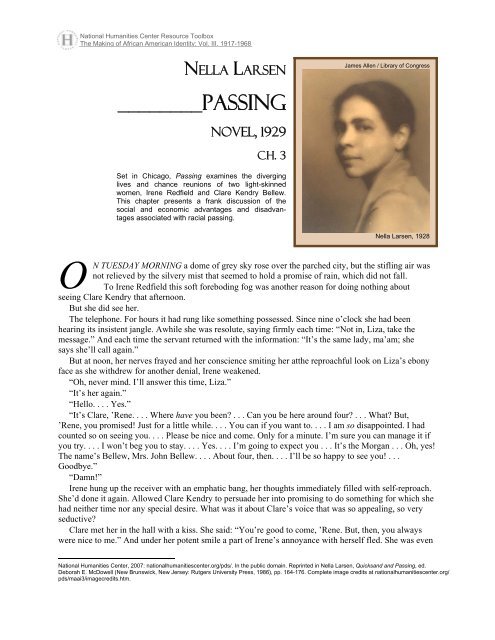

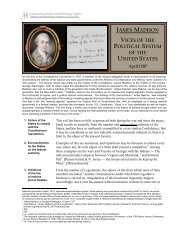
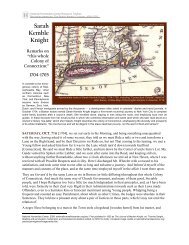
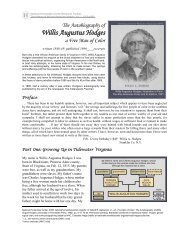
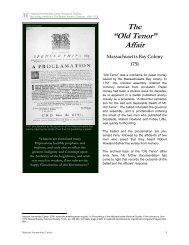
![The Requerimiento [Requirement], Council of Castile, 1510 ...](https://img.yumpu.com/21979685/1/190x245/the-requerimiento-requirement-council-of-castile-1510-.jpg?quality=85)
